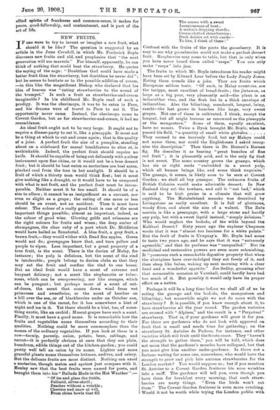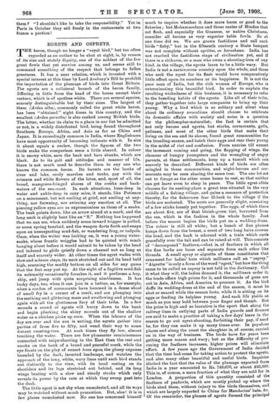NEW FRUITS.
IF one were to try to invent or imagine a new fruit, what should it be like ? The question is suggested by an
article in the June Cornhill, in which Mr. Frederick Boyle discusses new fruits and old, and prophesies that "the next generation will see marvels." For himself, apparently, be can think of nothing that could beat the strawberry. He quotes
the saying of the sage: " Doubtless God could have made a better fruit than the strawberry, but doubtless he never did"; but he seems to hesitate as to the possible addition of cream, —in this like the magnificent Bishop who declared that his idea of heaven was "eating strawberries to the sound of the trumpet." Is such a fruit as strawberries-and-cream imaginable ? In his childhood Mr. Boyle read of such a
prodigy. It was the cherimoya, it was to be eaten in Peru, and his dreams were of travel to Peru to eat it. The opportunity never came. Instead, the cherimoya came to Covent Garden, but as for strawberries-and-cream, it had no resemblance.
An ideal fruit ought not to be very large. It ought not to require a dinner-party to eat it, like a pineapple. It must not be a thing at which to cut and come again; that is the quality of a joint. A perfect fruit the size of a pumpkin, standing
about on a sideboard for casual breakfasters to slice at, is unthinkable. Indeed, the perfect fruit should require no knife. It should be capable of being cut delicately with a silver instrument upon fine china, or it would not be a true dessert fruit; but it should be best eaten as nectarines are best eaten, plucked cool from the tree in hot sunlight. It should be a fruit of which a thirsty man would think first ; but it must give nothing like a draught, or it would have to be compared with what is not fruit, and the perfect fruit must be incom- parable. Neither must it be too small. It should be of a size to allure ; it cannot be as insignificant as a currant, nor even so slight as a grape ; the eating of one more or less should be an event, not an accident. Then it must have colour. The colour of a really good fruit is one of the most important things possible; almost as important, indeed, as the colour of good wine. Glowing golds and crimsons are the right colours for fruits and wines; the deep amber of
champagnes, the clear ruby of a port which Dr. Middleton Would have hailed as Senatorial. A blue fruit, a grey fruit, a brown fruit,—they would wither with Dead Sea apples. Green would not do; greengages know that, and turn yellow and
purple to ripen. Less important, but a great property of a true fruit, is the scent. There is the durien of Malay, for instance ; the pulp is delicious, but the scent of the rind is intolerable ; people belong to durien clubs so that they may eat the fruit and confine the rind to one house. But an ideal fruit would have a scent of extreme and buoyant delicacy; not a scent like stephanotis or tuber- roses, which can be overpowering, nor like oranges, which can be pungent ; but perhaps more of a scent of out- of-doors, the scent that comes down wind from wet primroses and sweetbrier, or the scent of heather on a hill over the sea, or of blackberries under an October sun, which is one of the rarest, for it has somewhere a hint of night and ice in it. Yet there should be a hint, too, of some- thing exotic, like an orchid; Muscat grapes have such a scent. Finally, it must have a good name. It is remarkable bow the fruits and vegetables name themselves according to their qualities. Nothing could be more commonplace than the names of the ordinary vegetables. If you look at them in a row—turnip, parsnip, onion, potato, bean, cabbage, and carrot—it is perfectly obvious at once that they are plain, humdrum, edible things out of the kitchen-garden ; you could pretty well tell an onion by its name. Lighter and more graceful plants name themselves lettuces, endives, and celery.
But the delicate fruits are most distinct. Nothing can excel a nectarine, though melon and apricot just compare with it. Henley saw that the best fruits were named for poets, and brought them into his " Ballade Made in the Hot Weather ":— " Of ice and glass the tinkle, Pellucid, silver-shrill; Peaches without a wrinkle ; Cherries and snow at will, From china bowls that fill
The senses with a sweet Incuriousness of heat ; A melon's dripping sherds; Cream-clotted strawberries ; Dusk dairies set with curds— To live. f think pf these!"
Contrast with the fruits of the poets the gooseberry. It ie easy to see why gooseberries could not make a perfect dessert fruit. Raspberries may come to table, but that is only when you have never beard them called "rasps." You can only make "rasps" into jam.
The fruits to which Mr. Boyle introduces his reader might have been set by Edward Lear before the Lady Jingly Jones. Eating them sounds like a joke. They are fruits which Europeans seldom taste. "Of such, in Malay countries, are the tarippe, most excellent of bread-fruits ; the jiutawan, as large as a big pear, very pleasantly acid—the plant is an indiarubber vine, and the flesh lies in a thick envelope of indiarubber. Also the bilimbing, mandaroit, langsat, rambi—the last grows in bunches like large, very sweet grapes. Not one of these is cultivated, I think, except the langsat, but all might become as renowned as the pineapple or the mangosteen." Some of them, equally excellent, have no names. Twice a Dyak brought Mr. Boyle, when he passed his field, "a quantity of small white globules They seemed to me heavenly food, but my Malays could not name them, nor could the Englishman I asked recog. nise the description?' Then there is Dr. Becicari's Borneo fig. He describes it as bearing "great bunches of fine red fruit "; it is pleasantly acid, and is the only fig that is not sweet. The same country grows the guango, which has six or eight seeds "embedded in a sweet pulp, which all human beings like, and some think exquisite."
The guango, it seems, is likely soon to be seen at Covent Garden : we shall all buy quangos. The unknown fruits of British Colonies would make admirable dessert. In New Zealand they eat the tawhara, and call it "not bad," which is said to be high praise in a climate that will grow anything. The Matabeleland maueko was described by Livingstone as really excellent. It is full of glutinous, woody fibre, and about the size of a walnut. The Zulu marula is like a greengage, with a large atone and hardly any pulp, but with a sweet liquid instead, " simply delicious."
Who would neglect the bododo, of the wilds beyond the Kalihari Desert ? Sixty years ago the explorer Chapman wrote that it was " almost too luscious for a white palate."
But the fruit of fruits is Uruguay's. Mr. Boyle had some to taste two years ago, and he says that it was " extremely agreeable," and that its perfume was " unequalled." But its medicinal and restorative powers are even more astonishing, It " possesses such a remarkable digestive property that when the aborigines have over-indulged they eat freely of it, and then sleep like babes, waking up next morning with a clear bead and a wonderful appetite." Jos Sodley, groaning after that memorable occasion at Vauxhall, could hardly have had too much of it. But possibly it would only have its proper effect on a native.
Perhaps it will be a long time before we shall all of us be eating the guango and the bododo, the mangosteen and bilimbing ; but meanwhile might we not do more with the strawberry ? It is possible, if you know enough about it, to have strawberries all the year round. The garden varieties are crossed with " Alpines," and the result is a "Perpetual" strawberry. That is, if your gardener will grow it for you. For there are gardeners who do not look with approval on fruit that is small and needs time for gathering ; on the strawberry St. Antoine de Padone, for instance, and other varieties which will fruit until the frosts come. They " haven't the strength to gather them," you will be told, which does not mean that the gardener's muscles have collapsed, but that you must give him another under-gardener. Is there not a fortune waiting for some one, somewhere, who would have the strength to grow and pick late autumn strawberries for the London market ? You would suppose so ; but if you mention St. Antoine to a Covent Garden fruiterer his nose wrinkles into a sniff. The gardener will tell you, even though yon have them for breakfast every morning, that such straw- berries are nasty things. "Even the birds won't eat them." The Covent Garden fruiterer is even more crushing. Would it not be worth while trying the London public with them P "I shouldn't like to take the responsibility." Yet in Paris in October they sell freely in the restaurants at two francs a portion!











































 Previous page
Previous page